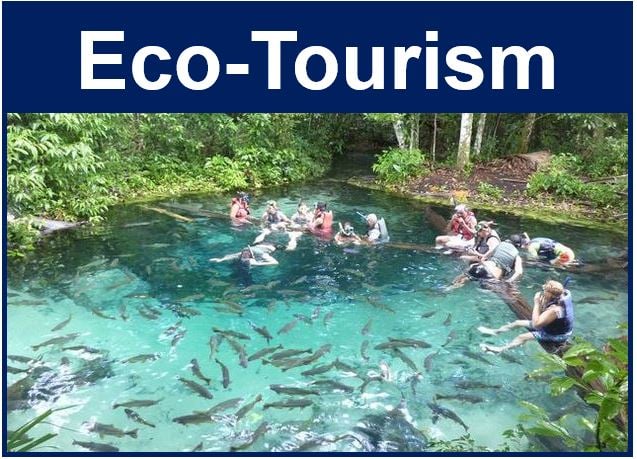Most of us think ecotourism is good for animals and wildlife in general. However, according to a recent study carried out at the University of California, if animals become too used to being near humans, and consequently lose their fear of potential predators, their risk of being eaten is greater.
The researchers, led by Prof. Daniel Blumstein, wrote about their study in the academic journal Trends in Ecology & Evolution.
Prof. Blumstein said:
“Recent data showed that protected areas around the globe receive 8 billion visitors per year; that’s like each human on Earth visited a protected area once a year, and then some!”
“This massive amount of nature-based and ecotourism can be added to the long list of drivers of human-induced rapid environmental change.”
 Tourists in Brazil interacting with fish in a tributary of the Cuiabá River. (Image: UCLA)
Tourists in Brazil interacting with fish in a tributary of the Cuiabá River. (Image: UCLA)
The authors say their new report sets out a novel way of thinking about the potential long-term effects of nature-based tourism and encourages reserve managers and scientists to factor in these harmful impacts when considering how sustainable different types of tourism might be. Especially those aimed at enhancing biodiversity.
Ecotourism alters animal behavior
The researchers found that when humans are present, the way animals act changes. These changes sometimes spill over into other parts of their lives, which could put them at risk in ways that are not immediately evident.
Prof. Blumstein said:
“When animals interact in ‘benign’ ways with humans, they may let down their guard.”
As animals become accustomed to having humans around, they may become less fearful (bolder) in other situations. “If this boldness transfers to real predators, then they will suffer higher mortality when they encounter real predators,” he added.
Domestication, urbanization and ecotourism are very similar in some respects. Regular interactions between humans and animals may lead to a kind of taming (habituation). Urbanization refers to the migration of people into cities from the country.
In previous studies, researchers had found that domesticated silver foxes were less fearful; a process that results from evolutionary changes, and also from regular contact with humans.
 Prof. Daniel Blumstein (Image: UCLA)
Prof. Daniel Blumstein (Image: UCLA)
When exposed to simulated predatory attacks, domesticated fish are less responsive than their wild counterparts. It takes more to make fox squirrels and birds that live in urbanized areas flee, compared to birds and fox squirrels that live in rural areas.
Ecotourism makes animals less alert
If humans are around, natural predators may be discouraged, which creates a kind of safe haven for smaller creatures. These smaller animals may become bolder.
When humans are present, for example, the vervet monkey has fewer run-ins with its main predator, the leopard. In Grand Teton National Park, in the US state of Wyoming, pronghorn and elk in areas with more humans spend less time in a state of alert and more time feeding.
The question is to what extent do these bolder and more relaxed behaviors with humans around transfer to other situations, which could leave the animals at greater risk when their natural predators are present? Do they walk right into the arms of poachers?
The authors wrote:
“We know that humans are able to drive rapid phenotypic change in other species. If individuals selectively habituate to humans–particularly tourists–and if invasive tourism practices enhance this habituation, we might be selecting for or creating traits or syndromes that have unintended consequences, such as increased predation risk.”
“Even a small human-induced perturbation could affect the behavior or population biology of a species and influence the species’ function in its community.”
Prof. Blumstein said he and his team hope to carry out further research on the interactions of humans with wildlife.
Prof. Blumstein added:
“It will now be essential to develop a more comprehensive understanding of how different species and species in different situations respond to human visitation and under what precise conditions human exposure might put them at risk.”
According to The International Ecotourism Society, ecotourism is:
“Responsible travel to natural areas that conserves the environment and improves the well-being of local people.”

